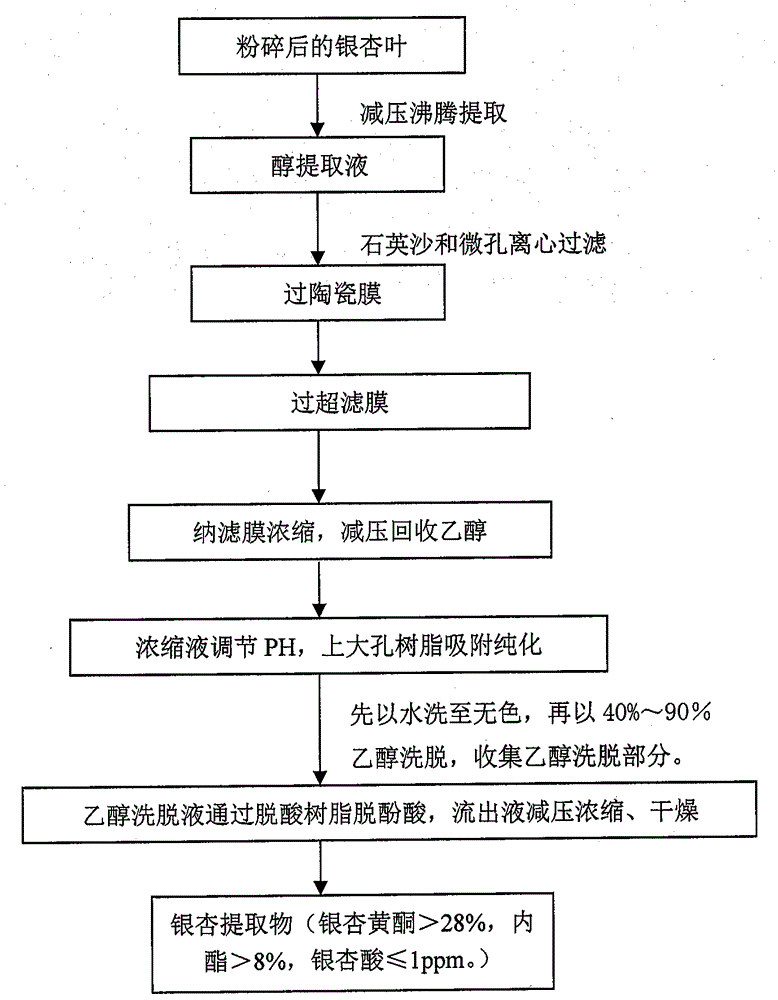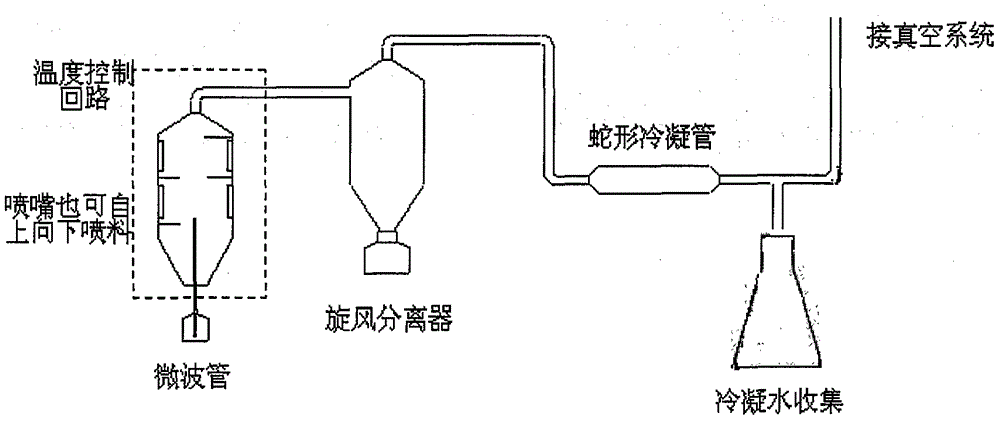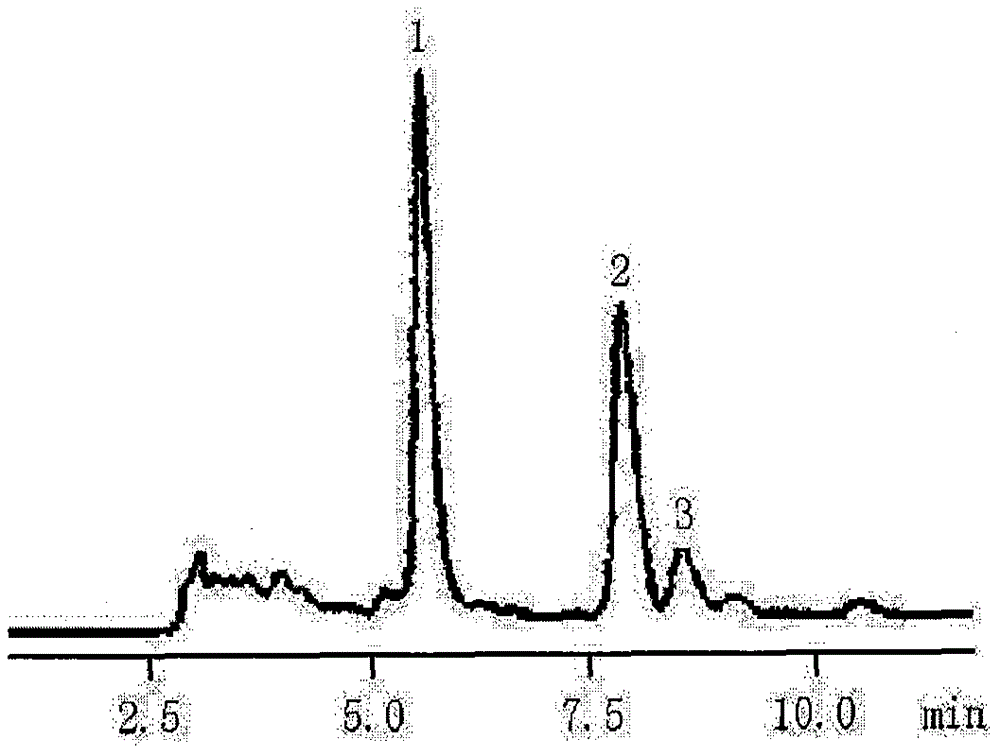A method for preparing low-acid ginkgo extract by negative pressure boiling extraction
A technology of ginkgo extract and negative pressure extraction, which is applied in the directions of medical raw materials, drug combinations, cardiovascular system diseases, etc. derived from Ginkgo biloba The problem of low ester content, etc., achieves the effect of simple process operation, shortened extraction time and improved extraction rate
- Summary
- Abstract
- Description
- Claims
- Application Information
AI Technical Summary
Problems solved by technology
Method used
Image
Examples
Embodiment 1
[0052] 1. HPLC analysis method of total flavonoids in ginkgo extract
[0053] Using UV detection method
[0054] (1) Chromatographic conditions: Column C 18 ODS (Φ4.6mm×200mm, 5μm), mobile phase: methanol-water (containing 0.4% phosphoric acid) volume ratio 50:50, detection wavelength 360nm, flow rate 1mL / min.
[0055] (2) Standard curve drawing: accurately weigh out appropriate amounts of quercetin, kaempferol, and isorhamnetin reference substances, place them in a 10mL volumetric flask, dissolve and dilute to the mark with methanol, shake well, and make a concentration of 0.854 respectively , 0.562, 0.259mg / mL mixed reference solution; sequentially accurately measure the mixed reference solution 0.05, 0.10, 0.15, 0.20, 0.25, 0.30, 0.40, 0.50mL in a 5mL volumetric flask, dilute to the mark with methanol, After shaking up, 10μL of samples were taken for chromatographic analysis. The standard curve equation of quercetin is y=51908x+63760, r=0.996; the standard curve equation of kaem...
Embodiment 2
[0072] Vacuum extraction and extraction liquid pretreatment
[0073] Crush the fresh ginkgo leaves or dried ginkgo leaves to less than 0.5cm, use 40-80% ethanol as the extraction solvent, and extract by negative pressure boiling for 30-90 min, preferably 45-60 min. The ratio of extraction solvent to ginkgo leaf powder is 1-30: 1, preferably 5-15:1, extraction temperature is 20-70°C, preferably 40-60°C, extraction pressure is 0.01-0.09MPa, preferably 0.06-0.09MPa, extraction is 1 to 4 times, preferably 2 to 3 times, extraction The solution is filtered by quartz sand with a particle size of 100-300 mesh, and then subjected to microporous centrifugal filtration with a pore size of 1.0 μm to 1.5 μm and a centrifugal speed of 3000 to 6000 rpm; the extraction rate of total flavonoids of Ginkgo biloba is greater than 90%. The extraction rate is greater than 80%.
[0074] The present invention studies the influence of extraction pressure, alcohol concentration, material-to-liquid ratio an...
Embodiment 3
[0083] Membrane purification process
[0084] Pass the filtrate through a ceramic membrane with a pore size of 0.1μm~0.8μm, preferably a ceramic membrane with a pore size of 0.5μm and an operating pressure of 0.15~0.3MPa, and continue to pass the ceramic membrane permeate through an ultrafiltration membrane with a rejection relative molecular mass of 5000~50,000 Preferably, the relative molecular mass of the ultrafiltration membrane is 10000, the permeate of the ultrafiltration membrane is concentrated with a nanofiltration membrane with a relative molecular mass of 100-300, the concentrated solution is decompressed to recover ethanol, and the pH of the concentrated solution is adjusted with acid After 4-6, the upper column liquid is obtained.
[0085] The present invention selects ceramic membrane pore sizes of 0.1 μm, 0.2 μm, 0.5 μm, and 0.8 μm to investigate the influence of the membrane pore size on the membrane flux, the transfer rate of total flavonoids and total lactones, an...
PUM
 Login to View More
Login to View More Abstract
Description
Claims
Application Information
 Login to View More
Login to View More - Generate Ideas
- Intellectual Property
- Life Sciences
- Materials
- Tech Scout
- Unparalleled Data Quality
- Higher Quality Content
- 60% Fewer Hallucinations
Browse by: Latest US Patents, China's latest patents, Technical Efficacy Thesaurus, Application Domain, Technology Topic, Popular Technical Reports.
© 2025 PatSnap. All rights reserved.Legal|Privacy policy|Modern Slavery Act Transparency Statement|Sitemap|About US| Contact US: help@patsnap.com



